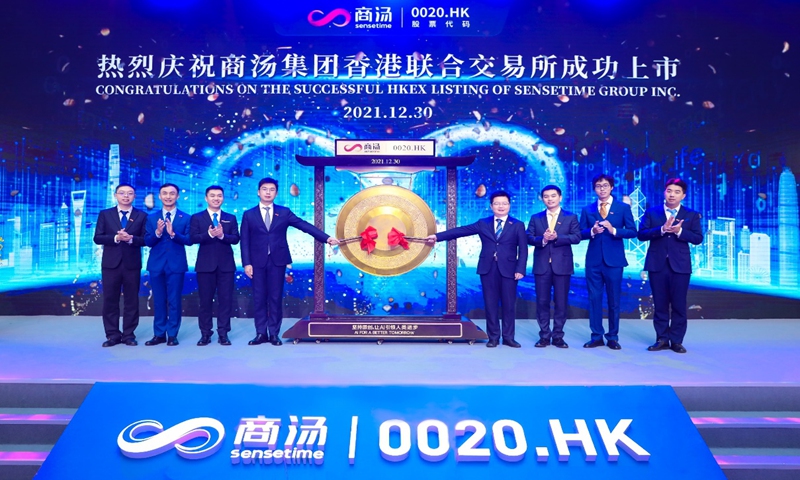
Chinese AI firm SenseTime went public on Thursday. Photo:Courtesy of SenseTime
Chinese artificial intelligence (AI) firm SenseTime, which has recently been blacklisted by the US, made its debut on the Hong Kong Stock Exchange on Thursday, with share prices soaring as much as 23 percent on the first day of trading, shedding light on an increasingly bright path for Chinese firms to return to domestic markets amid US crackdown.
Analysts noted that as the US government continues to target Chinese tech firms, more companies will likely pursue listings in Hong Kong or on the mainland to fend off increasing political risks in the US, which would help boost domestic financial markets and technological development.
SenseTime, the largest AI software company in Asia, opened at HK$3.91 on Thursday, above the initial public offering price of HK$3.85. Its market value soared to HK$140 billion ($17.94 billion) after listing, making it the largest AI unicorn on the Hong Kong market, before closing at HK$ 4.11 per share, up 6.75 percent.
SenseTime was due to start trading on December 17, but it had delayed its IPO plans after the US Treasury Department placed the firm on a list of "Chinese military-industrial complex companies" on December 10, essentially banning US investors from investing in the company.
But the AI company revived its IPO on December 20 and said that, "due to the dynamic and evolving nature of the relevant US regulations, we have required to exclude US investors" from buying shares in the IPO.
The successful listing and first day performance of SenseTime showed that the US' clampdown on Chinese tech companies will not suppress the sector, which has been developing rapidly, market watchers said.
"SenseTime announced to revive its IPO and went public shortly after it was sanctioned by the US. Its swift response reflected the trust and approval of investors," Liu Dingding, a Beijing-based independent analyst, told the Global Times on Thursday.
The firm's share price surged 15 percent at market opening on Thursday and finished nearly 7 percent higher, which are all encouraging signs for other AI companies, Liu noted. "It shows that US sanctions and external factors are not the main factors affecting the development of the industry. If a company is strong enough, even if US investors pull out, other investments will flood in," he said.
Other leading Chinese AI firms, including Beijing Megvii Co, YITU Technology and CloudWalk Technology, have all launched their IPO plans.
Dong Dengxin, director of the Finance and Securities Institute at the Wuhan University of Science and Technology, also noted that the US' clampdown on SenseTime may have actually raised the profile of the company as it only target companies that possess advanced innovation and research capability.
According to the firm's prospectus, SenseTime's revenue increased from 1.85 billion yuan ($290 million) in 2018 to 3.44 billion yuan in 2020, achieving a compound annual average growth rate of 36.4 percent. The company's revenue reached 1.65 billion yuan in the first half of 2021, a year-on-year increase of 91.8 percent.
In terms of revenue in 2020, SenseTime is the largest AI software company in Asia, and with a market share of 11 percent, the largest computer vision software provider in China, according to Frost & Sullivan.
SenseTime's successful listing shows that the US' crackdown can't stop the listings of China's AI companies, Dong said.
"If the US blocks the channels for Chinese companies, especially AI companies, to list in the US, they can just go to Hong Kong," Dong said, adding that the Hong Kong Stock Exchange will definitely become the preferred listing place for Chinese AI companies because of its high level of internationalization and marketization, versus a politicized US market as China's AI industry sprouts.
The global AI software market size is expected to reach $121.8 billion in 2025, representing a compound annual growth rate of 31.9 percent from $30.5 billion in 2020. The AI software market in China is expected to grow at 41.5 percent from $29.5 billion in 2020 to $167.1 billion in 2025, which would make it the fastest growing among major markets globally, according to Frost & Sullivan.




